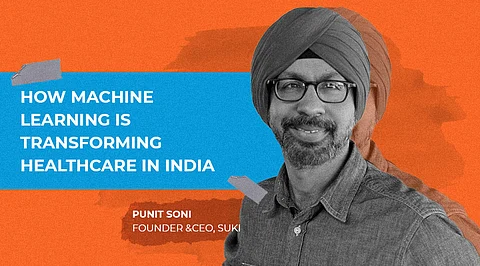
- Insights
- Cryptocurrencies
- Stocks
- White Papers
- Industry
- Geography
- Insights
- Cryptocurrencies
- Stocks
- White Papers
- Industry
- Geography


Healthcare has become one of the biggest sectors in India's economy. According to a report from NITI Ayog, the sector has grown at a compound annual growth rate (CAGR) of 22% since 2016. Millions of jobs have been created, with millions more to come. How can a country short on trained clinical resources with vast inequities in care distribution grow at this pace? Machine learning is one way to help close the gaps.
Healthcare settings are flooded with unprecedented volumes of complex data from clinicians' notes, medical devices, labs, and more. Remote patient wearables are increasingly adding to the onslaught. Electronic health records are helping digitize the information, but their job is not to ease the administrative workload on the front end or provide at-a-glance decision support.
All the data coming in is only as valuable as the insights that can be quickly gleaned from it and appropriately actioned to improve healthcare delivery. Machine learning can make that possible, especially for digitized data sets with clear patterns. Machine learning not only collects but also unifies, data from disparate sources. It can perform the complex calculations required for doctors, nurses, and other members of the healthcare team to make quick sense of raw physiological, behavioral, and imaging information.
Machine learning reduces the workload of physicians, radiologists, pathologists, and other providers by employing algorithms to garner insights. Automated workflows designed around how healthcare teams work in the real world are often used in tandem for easy information sharing and collaboration. Typical applications include:
Precise predictive analysis of what a given patient will likely need next has historically been stopped by two barriers: the burden of collecting data and the difficulty of calculation. With machine learning, data collection speed and calculation complexity no longer depend on what humans can do by hand. Using these powerful algorithms, one can imagine treatment decisions tailored to each patient's specific situation and better outcomes as a result.
India is poised for an exciting digital transformation in healthcare. The penetration of machine learning and other innovative technologies, including automation and other AI techniques like natural language processing, is surging—with 5G coming soon. A vibrant ecosystem of startup and established health-tech companies is now in-country, with a rising population to fill new roles. Healthcare providers have gained a greater awareness of tech-enabled ways to do more with less manual effort. The government has stepped up with increased spending on evolving healthcare delivery, and the general public is in support.
Since 2020 due to the Covid-19 pandemic, there has been a huge focus by the government on investing in India's healthcare infrastructure. This has also enabled technology firms to dive into the healthcare segment and innovate to contribute to the improvement of healthcare facilities in the country. Under the Digital India Initiative, the government has recently announced the launch of the Ayushman Bharat Health Mission which aims at creating India's digital health ecosystem. The initiative focuses on creating digital health records for the citizens and their families to access and share digitally. Under this mission, the citizens will receive a randomly generated 14-digit number used for the purposes of uniquely identifying persons, authenticating them, and threading their health records only with their informed consent across multiple systems and stakeholders. Moreover, inclusion is one of the key principles of ABDM. The digital health ecosystem created by ABDM supports continuity of care across primary, secondary, and tertiary healthcare in a seamless manner. It aids the availability of health care services, particularly in remote and rural areas through various technology interventions like telemedicine etc.
Digital health start-ups in India provide a vast backdrop for solutions with the government's push to strengthen the digital healthcare infrastructure. The start-up landscape within the Indian healthcare ecosystem goes well beyond a specific disease, therapeutic area, geography, type of product, and service or business model. In a country where access to affordable healthcare is still a looming issue, the public stands to gain immensely from the development of the Digital Health industry. The ABDM is a one-of-a-kind strategy to unify the healthcare system in India and promote innovation in the industry. With the public interest in the minds of both the Government as well as the innovators, it remains to be seen how Digital Health will be perceived in law. While there is a long way to go, the use of AI and ML has gained a strong foothold in India over the past year and we foresee a promising future for the industry.
Punit Soni, Founder & CEO, Suki
